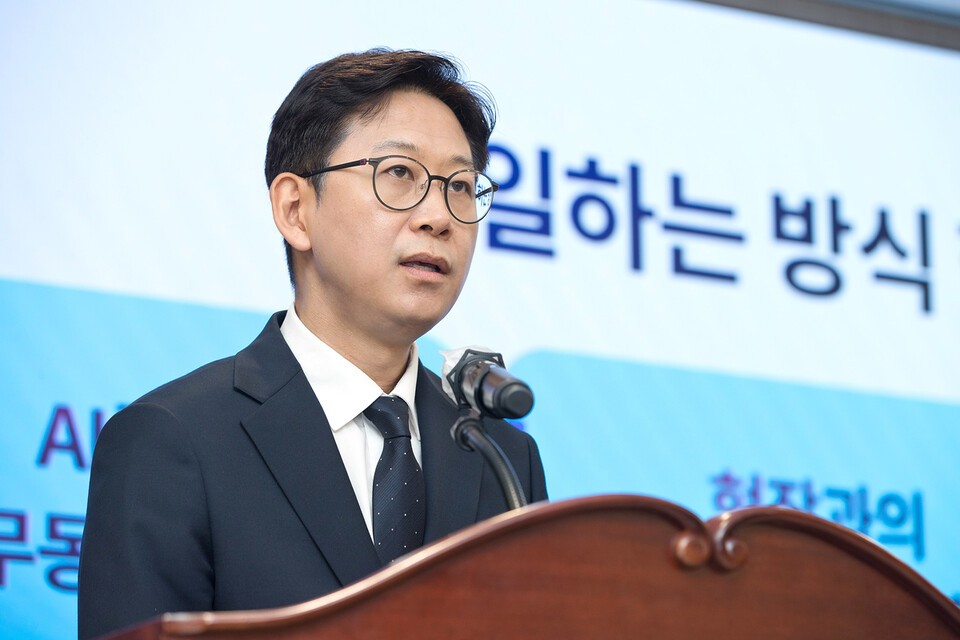On the morning of the 19th, Minister of Science, Technology and Information, Mr. Bae Gyeong-hoon, visited the Urban Control Center in Gangnam-gu, Seoul. In a subsequent meeting, discussions were held on artificial intelligence and digital-based natural disaster response strategies with officials from relevant ministries such as the Ministry of Public Administration and Security, and the Ministry of Environment, as well as industry and research experts.
Due to climate change, the frequency of extreme weather events such as heavy rain and heatwaves is increasing, leading to more complex natural disasters and larger scale damages. As a result, new technology-based response strategies are required, as existing disaster response systems have limitations. Artificial intelligence technology is gaining attention as a means to address these issues.
The Ministry of Science, Technology and Information is collaborating with the Office for Government Policy Coordination, the Ministry of Public Administration and Security, the Ministry of Environment, and others to explore prevention and response strategies using artificial intelligence and digital technology against natural disasters. AI can be used to integrally analyze disaster-related data and geographical information to predict risks beforehand and swiftly and accurately analyze the extent and spread of damage when disasters occur.

Prior to the meeting, Minister Bae was briefed on the city disaster response status using intelligent CCTV at the Urban Control Center and encouraged the on-site personnel.
During the meeting, examples were shared of challenges faced by private companies and demand organizations in applying AI technology from the development stage to actual disaster response sites. Additionally, ways to expand the use of AI in natural disaster response were discussed.
The meeting was attended by Minister Bae Gyeong-hoon from the Ministry of Science, Technology and Information, officials from the Ministry of Public Administration and Security and the Ministry of Environment, and companies developing AI products and services for disaster response such as Cudo Communication, IntelliVIX, Aegis, and Alchera. Research institutes such as the Korea Institute of Civil Engineering and Building Technology, the Electronics and Telecommunications Research Institute, and the National Disaster Management Research Institute, as well as agencies like the Information and Communication Industry Promotion Agency and the Korea Intelligent Information Society Promotion Agency also participated.
The Korea Intelligent Information Society Promotion Agency presented cases of developing digital twin-based urban flood response systems and dam basin flood forecasting water management platforms, which were carried out in collaboration with the Ministry of Science, Technology and Information and the Ministry of Environment. They also introduced a flood season road hazard alert service that has been enhanced through public-private cooperation since last year.
Cudo Communication shared its trials and tests of AI CCTV with Bucheon City starting from 2025, applying ICT regulatory sandbox exemptions granted by the Ministry of Science, Technology and Information. They also emphasized the importance of utilizing raw data necessary for AI model training during disasters such as landslides and flooding.
In the subsequent discussion, experts from both public and private sectors exchanged opinions on expanding the use of AI and digital technologies in natural disaster response processes. The government shared technology effects that the developing AI-based natural disaster response services and supply planning bodies and companies perceived, and considerations for field application. They gathered opinions on enhancing public safety based on these insights.
Participants emphasized the need for research into developing AI systems using high-quality disaster situation data and geographical information held by local governments. They also agreed on the importance of establishing systems where the developed applications are used continuously in practice to enhance accuracy and sophistication. The need for institutional reviews for the introduction of AI in the public sector to ensure that operational staff can use these AI systems without difficulties was also raised.
Minister Bae Gyeong-hoon of the Ministry of Science, Technology and Information stated, “In a situation where it is becoming more difficult to predict natural disasters due to climate change and the damage is increasing, we are focusing on the potential of AI as a key to overcoming the limitations of existing response systems. We will lay the foundation for activating the use of AI and digital technologies in natural disaster response.”